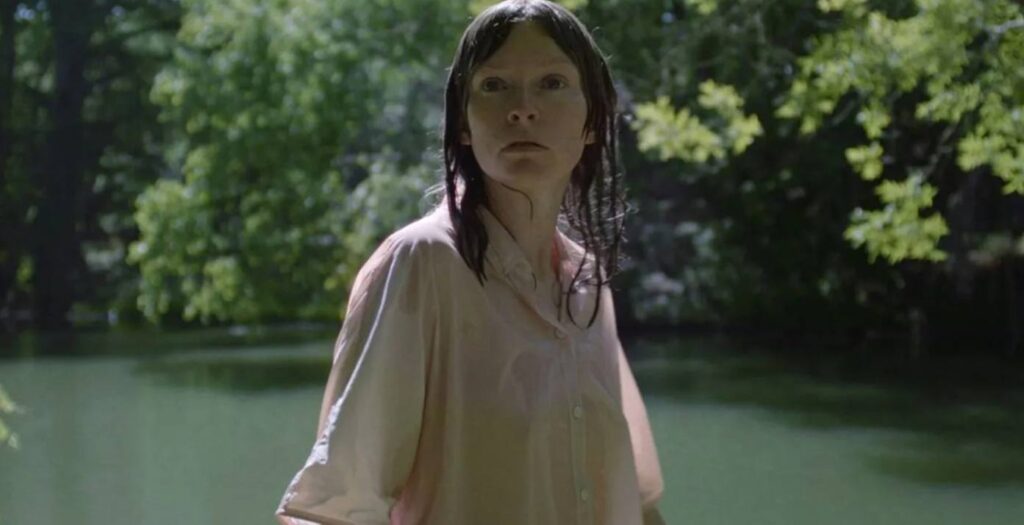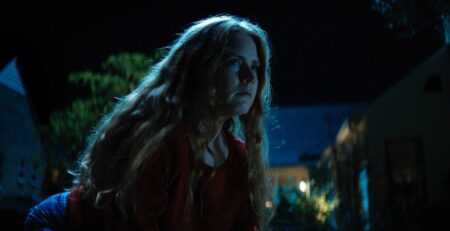Family Portrait is a whimsically anxious feature debut for writer-direct Lucy Kerr. Set at the dawn of Covid, the film follows a Texas family on a morning when they have planned a group picture. When the group gets bad news, the matriarch disappears, leaving her daughter Katy (Deragh Campbell) to make the picture become a reality. Accompanied by her boyfriend Olek (Chris Galust), Katy is, for the most part, alone. Her family doesn’t respect her boyfriend, and she is the only one left caring about the portrait’s completion.
Her family members move in and out of her view and across the estate. As she tries to gather them, Katy begins to relinquish herself little by little. There isn’t anything truly harrowing happening in Family Portrait, at least in the traditional sense.
Family Portrait’s unique approach to sound keeps the audience in a constant sense of unease. Andrew Siedenburg and Nikolay Antonov use the banal noises of the environment, which are simple, but their intensity can make you shift in your seat. They create a sense that you’re watching intimate private moments that you shouldn’t be watching. As the family environment gets more tense as the film continues, that banality of life is almost oppressive.
Family Portrait is an extremely sparse and simply constructed film that succeeds because it clings to the viewer through empathy. You have been in that situation. You have dreaded seeing your family, or you have had family ignorantly disrespect your partner, or you just get anxious when your entire family is in one place. The film doesn’t need to do a lot to make you care. Instead, its slice-of-life storytelling and attention to the smallest pieces of life capture the depth of the simple portrait. With shots of trees or a caterpillar inching toward the shoulder of a character lying on the grass, these incredibly tiny moments with their engrossing audio feel larger than they are.
Katy is stuck in a loop. She just wants to take the family portrait, even with her boyfriend standing on the outside; it just needs to happen. But as she tries and tries to herd her family to the location and finds her mother reeling from a death close to the family, the film’s timeless quality makes you question whether or not this is reality. The best way to describe the film as it develops and Katy dissociates is Limbo.
I have been in situations where I desperately wanted my family to accept a partner, and Katy’s determination and exhaustion are recognizable. But as the conversations point to the family’s wealth, it’s clear that acceptance isn’t necessarily in their vocabulary. While Olek has been left out of the photo because he hasn’t married Katy, she is also lingering just outside of the family as well.
With a short runtime of just over an hour, Family Portrait is about what it makes you feel, not what it’s telling you. Truthfully, the film tells you very little. The unease Katy feels could be about something that she’s scared will happen after the photo, something that happened before she and Olek came onto the estate, or if something bad is happening right now, at the moment. The entire setup is ominous, and it never truly tells you why. Instead, you can map your experiences onto the increasingly despondent Katy.
Family Portrait is a smart film. The uncertainty of the film’s ending will either resonate with you or it won’t. You’ll fill the emptiness with your experience, or you’ll just leave it hollow. It’s really up to you.
Family Portrait is available now on VOD.
Family Portrait
-
Rating - 8/108/10
TL;DR
Family Portrait is a smart film. The uncertainty of the film’s ending will either resonate with you or it won’t. You’ll fill the emptiness with your experience, or you’ll just leave it hollow. It’s really up to you.





